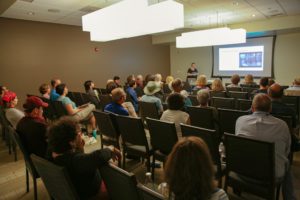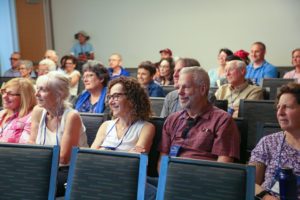Going Long with TVGoneJewy at Limmud Bay Area Festival
I arrived at Sonoma State University for the Limmud Bay Area Festival, excited about presenting three sessions to the attendees. But there was one lurking worry: that my first presentation was too long.
I had 70 minutes to cover “TV Gone Jewy” – the exploration of various scenes from contemporary television that mentions Jewish things or talks extensively about Jewish identity. But I definitely had more than 70 minutes of material. I went through the presentation and trimmed – starting clips when the Jewy things happened instead of at their start to provide context, cutting slides here and there. I had also built in about ten minutes at the end for conversation. I could do it in 70 minutes, I thought.
As we met that Friday afternoon as the Jewish conference/festival, gathering several hundred community learners interested in unfiltered or unaffiliated Jewish learning, began, I looked out at the room, about 40 attendees of all ages, Jewish identities and backgrounds and breathed. Here we go.
I spoke quickly, in tribute to my east coast roots, and before I knew it we were at 60 minutes.
“How are we doing on time?” I asked the crowd. “Have a few more minutes?”
“Keep going!” the crowd urged.
“OK,” I said, “but if you need to leave to go to another session, or for whatever reason, we can officially end the session and if people want to stay, you’re welcome but not required. I’ll keep going for whoever stays!”
About five people walked out, waving, smiling and saying thank you. The rest of us continued…for another hour. About 25 people stayed to the very end.
That was just the beginning.
On Friday night, I led an improv workshop that spawned attendee connections, and conversations that went till 5 in the morning; on Saturday, I moderated a panel about loss. (See here for testimonials about these presentations.) Over the weekend, I had conversations with dozens of Bay Area residents who were eager to unpack the TV Gone Jewy session, to share observations on Jewish identity on the big and small screen, and to talk about whether that representation is good or bad news for people who identify as Jewish in a world where anti-Semitism is on the rise. Spoiler: Not everyone thought it was a good thing.
But through all of these sessions, I was grateful for the opportunity to speak with expertise in front of an appreciative audience. I was grateful for conversations that ran gleefully overtime, beyond the limits of the sessions, because of an enthusiastic audience.
It was an honor to share the things I’m passionate about – from pop culture to humor to grief – through a Jewish lens.
#TVGoneJewy is an inside look at how much Jewish content is seeping into contemporary entertainment, leading to greater representation for Jews of all denominations, education and observance levels. My improv for Jews session is an icebreaker, but also teaches Jewish concepts about being in community. And at the community forum about grief, we shared helpful resources and increased awareness of how to support each other and others who are dealing with loss, not just in the first few days, or even the first year after a loss, but beyond.
Limmud is one of these special spaces, where people open their minds to new ways of seeing the world and their Jewish identities. I miss the annual LimmudLA conferences we had in Los Angeles for several years after I moved here; and love being at Limmud, in whatever city, whenever I’m financially able to (an ongoing challenge for a freelancer, unfortunately). I once dreamed of going around the world for a full year, Limmud conference to Limmud conference, experiencing the world and the people of different communities through this experimental educational lens. That’s not really feasible, but attending a Limmud conference whenever I can reconnects me to the spirit of experimentation and innovation that fuels my creativity, expands my social circles, and enables me to appreciate the space to explore so many of the things that make me who I am.

